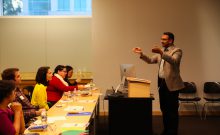Written by Aniket Singh – author of “Intern Abroad This Summer”
You can have breakfast at Delhi and lunch in Dubai – that’s how small the world has become today. With increased mobility and connectivity, the world is much close-knit than it was two decades ago. Borders are more porous now and the products that we often use are standardized these days – children in Berlin would be playing with the same toys as those in Bangkok or Bangalore.
Hence, it is no longer possible to live like an ostrich with your head buried in the sand, unheedful of the world’s affairs. To survive and thrive in such a global environment, it is essential to become a true world citizen. Here are three traits that you must learn to be a part of this closely-knit world:
Creative thinking and problem solving: Children are born creative thinkers and problem solvers, but, as we grow up, we tend to often lose out on these skills. However, as we hurtle on in full speed in a world that is becoming more complex, the ability to think ‘out of the box’ and find solutions to the myriad problems that face us in our daily lives, is one of the most critical traits of being a global citizen. A way in which you can enhance your problem solving and creative thinking skills is by training your mind to start thinking in terms of questions and not just statements.
Efficient communicator: To be a true world citizen you need to perfect your communication skills. Your ability to network across cultures and languages by understanding what drives and inhibits different cultures, will help you connect with a wider group of people. You need to be able to express your views and ideas clearly, but also have the willingness to change these if they have been proved wrong. As an efficient communicator, you also need to be a willing listener and learner. Make it a point to chat up with people you meet, listen to their views and ideas, ask them questions that will help you better understand where they come from and exchange ideas with them. This will allow you to make many more friends and take home numerous memories.
Cross-cultural awareness and adaptability: Life in different parts of the world may be completely different from what you are used to back home – the food, the language, customs, culture may all seem alien to you at first, but it is finally about how much you adapt to the host culture and what you take back from it. As a global citizen, you need to understand and accept that there are people who are different from you. You need to accept these differences and avoid reacting in any way that impacts a culture and its people negatively. You should also be willing to change your schedules and routines to suit how things work at a new place. Instead of wasting time comparing and complaining about how thigs were much different back home, as a world citizen you would submerge yourself in the new culture and try to learn as much as you can from it.
About the author:
Aniket Singh works for Apple Inc. in California, United States. He is also the author of “Intern Abroad This Summer”.
Aniket holds a BTech degree in Electrical Engineering from the IIT, Madras, Chennai, and a Master’s degree in Wireless Systems from Politecnico Di Torino in Torino, Italy. He has interned at the University of Southampton in the United Kingdom and Ecole Polytechnic Federale de Lausanne in Lausanne, Switzerland during this studies.
Visit him at www.aniketsingh.com
Check out his book at www.internabroadthissummer.com










